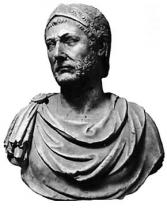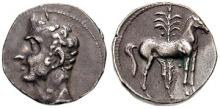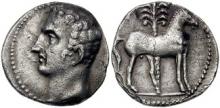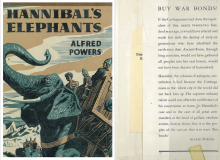(1) Hannibal, Hamilcaris fīlius, Karthāginiēnsis. Sī vērum est, quod nēmō dubitat, ut populus Rōmānus omnēs gentēs virtūte superārit, nōn est īnfitiandum Hannibalem tantō praestitisse cēterōs imperātōrēs prūdentiā, quantō populus Rōmānus antecēdat fortitūdine cūnctās nātiōnēs.
(2) Nam quotiēnscumque cum eō congressus est in Italiā, semper discessit superior. Quod nisi domī cīvium suōrum invidiā dēbilitātus esset, Rōmānōs vidētur superāre potuisse. Sed multōrum obtrectātiō dēvīcit ūnīus virtūtem.
(3) Hic autem, velut hērēditāte relictum, odium paternum ergā Rōmānōs sīc cōnservāvit, ut prius animam quam id dēposuerit, quī quidem, cum patriā pulsus esset et aliēnārum opum indigēret, numquam dēstiterit animō bellāre cum Rōmānīs.
notes
(1) Hannibal: Most Carthaginian proper names are rendered in Latin as third declension nouns. In Punic, the language spoken by the Carthaginians, Hannibal meant something like "The Favorite of Baal." Baal Hammon was the chief god of the Carthaginians.
Hamilcaris: Hamilcar (c. 275–229 BC) was a Carthaginian general and father of three sons: Hannibal, Hasdrubal, and Mago, all of whom led armies against Rome in the Second Punic War. In the latter phase of the First Punic War (264–241 BC), Hamilcar waged a brilliant guerilla campaign to defend Mount Hercte and Mount Eryx in Sicily. His aptitude for quick, devastating raids earned him the nickname Barca or "Thunderbolt." Hamilcar so impressed the Romans with his ferocity and ingenuity that, when Carthage surrendered, Hamilcar and his soldiers were allowed to keep their weapons, a symbol that they were never defeated. Nepos recounts these exploits in the first chapter of his Life of Hamilcar. Before Hamilcar died in battle in 229 BC, he conquered extensive territory in Hispania and founded the city of Barcino (modern Barcelona).
Karthāginiēnsis: Adjectives ending in –ēnsis indicate a person or thing that belongs to something or comes from someplace (AG §249).
sī vērum est: indicative because Nepos believes that his statement is true. He further emphasizes its veracity with the relative clause, quod nēmō dubitat.
ut populus Rōmānus omnēs gentēs virtūte superārit: substantive clause that articulates what is vērum (AG §571c).
virtūte: ablative of specification, revealing the quality in which the populus Rōmānus surpasses omnēs gentēs (AG §418). Nepos refers to the Romans' military aptitude, not their "virtue" in general. Nepos' general stance, articulated in the Prologus to the Lives of Outstanding Commanders, is that no single people has a monopoly on virtue.
superārit: = superā(ve)rit, syncopated perfect (AG §181).
nōn est īnfitiandum: future passive periphrastic indicating necessity or obligation (AG §500.2), "it must not be denied that...."
Hannibalem: accusative subject belonging to the clause introduced by tantō, but placed before tantō for extra emphasis.
tantō…quantō: ablatives of degree of difference linking two correlative clauses with comparative sense (AG §414a), "by as much as (quantō)...by just as much (tantō)...." Nepos underscores the comparison between Hannibal and the Roman people by including the same five elements in each correlative clause.
prūdentiā…fortitūdine: ablatives of specification, like virtūte in the first sentence. Nepos contrasts the tactical brillance of Hannibal (prūdentia) and the resolute durability of the Romans (fortitūdō) that will enable the Romans to withstand Hannibal's initial victories, regroup, and ultimately prevail. Note how Nepos has framed the war as a contest between Hannibal and the Roman people rather than between Carthage and Rome, a theme he elaborates in the next paragraph.
antecēdat: subjunctive because it appears in a dependent clause in an indirect statement; it does not connote any sense of doubt or uncertainty (AG §591).
(2) Nam quotiēnscumque cum eō congressus est: note the frequent alliteration, a common feature of Nepos' style.
eō: object of cum, referring to the masculine singular noun in the previous sentence (populō Rōmānō).
congressus est: > congredior; Hannibal is the understood subject.
semper discessit superior: Nepos makes the same declaration about Hannibal's father, Hamilcar (who died in battle). Hannibal was repulsed from Nola three times (215–214 BC) and fought many indecisive battles in the last decade of the war. Nepos here follows the tenacious myth of Hannibal's invincibility in battle.
quod nisi: "but if (he had) not"; analogous to quodsi, "but if."
domī: locative (AG §428k), referring generally to Carthage and its politics, which was riven by long-running factional strife. One Carthaginian faction, represented by Hamilcar and his sons, favored an aggressive policy of expansion outside of Africa. They believed that cultivating trade and conquering new territory would make Carthage powerful enough to confront the existential threat posed by Rome. The other faction, led by Hanno the Great, favored the agricultural interests of Carthaginian landowners and further territorial expansion in Africa. Since Hanno's faction viewed Rome as just another regional power, they favored accommodation of Roman interests, provided Rome did not interfere in Carthage’s African territory. As so often happens, these ideological differences became entangled with family vendettas and private grudges. Hanno, for example, sought to weaken the position of Hamilcar by publically accusing him of pederasty and of giving his daughter in marriage to his young lover, Hasdrubal the Fair, so that he could continue to enjoy Hasdrubal’s affections. The limited support and reinforcements sent to Hannibal during his Italian campaign and Hannibal’s dogged opposition to the landed aristocracy after the war should be viewed in the context of this long-running ideological and personal conflict.
cīvium suōrum: subjective genitive (AG §343) limiting invidiā.
vidētur: used personally with the infinitive, potuisse; "Hannibal seems likely to have been able...."
multōrum: subjective genitive (AG §343); i.e., many Carthaginians heaped abuse on Hannibal, rather than Hannibal reviled many people. Roman historians often framed their stories as a conflict between the genius and moral courage of a great individual and the envy and folly of the crowd. For more on the malice of the Carthaginian people towards Hannibal, read Supplementary Text: Livy 30.20.3–4.
(3) hic: i.e., Hannibal.
odium paternum: i.e., hatred possessed by his father (Hamilcar), not hatred of his father (by Hannibal). Nepos’ use of paternum emphasizes that the odium of Rome is passed down (relictum) "like an inheritance" (velut hērēditāte) in Hannibal’s family. In his Life of Hamilcar, Nepos states that this odium was the principal cause of the Second Punic War: “Hannibal, his son, was so wrought upon by the continual instigations of his father, that he would have chosen to die rather than not make trial of the Romans” (4).
ergā: "towards, against" + accusative. Nepos, like Plautus and Tacitus, uses ergā with unfriendly feelings (odium); ergā is more typically used with expressions of friendly feelings, while the synonyms contrā and adversus are more common with unfriendly feelings.
sīc cōnservāvit, ut…dēposuerit: sīc signals a result clause, ut…dēposuerit, "he so conservāvit his odium that…" (AG §537). Result clauses are often signaled by words such as tantus (see 2.1, 5.2 below), ita (2.5), adeō (4.3), or sīc (12.3); but these markers are not required (10.6).
prius animam quam id dēposuerit: "he would sooner surrender his life than it" (id, i.e. odium paternum). Words implying comparison like prius are often followed by quam several words or even clauses later (AG §434) or they may be written as one word (e.g. priusquam in 7.6, 11.1). dēposuerit: the perfect subjunctive in secondary sequence after conservāvit emphasizes the result (AG §485c).
quī quidem: "because he, indeed"; quī introduces a relative clause of cause (AG §540c) with the subjunctive, dēstiterit.
cum: concessive cum clause, "although…"
aliēnārum opum: "another’s resources." After Hannibal was expelled from Carthage in 195 BC he assisted first King Antiochus III of Syria and then Prusias I of Bithynia in their wars against Rome, as Nepos goes on to explain. [map: Hannibal's travels in the East (196–183 BC)]
animō: ablative of specification (AG §418), "in his mind."
vocabulary
(1) Hannibal Hannibalis m.: Hannibal ※
Hamilcar Hamilcaris m.: Hamilcar Barca (c. 275–229 BC), a Carthaginian general and father of Hannibal ※
Karthāginiēnsis Karthāginiēnsis: Carthaginian ※
īnfitior īnfitiārī īnfitiātus sum: deny, contradict
prūdentia –ae f.: practical skill, intelligence ※
antecēdō –cēdere –cessī –cessum: excel, surpass
fortitūdō fortitūdinis f.: strength, courage, resilience
nātiō nātiōnis f.: people, nation, race ※
(2) quotiēnscumque: however often, as often as
congredior –gredī –gressus sum: come together, meet, join battle ※
Italia –ae f.: Italy ※
dēbilitō –āre: weaken
obtrectātiō obtrectātiōnis f.: detraction, disparagement
dēvincō –vincere –vīcī –vīctum: conquer, overcome
(3) hērēditās hērēditātis f.: inheritance
paternus –a –um: fatherly, paternal
ergā: towards, in relation to (+acc.) ※
cōnservō –āre: retain, maintain, preserve ※
dēpōnō –pōnere –posuī –positum: lay down ※
indigeō –digēre –diguī: be in need of, require (+gen.)
dēsistō –sistere –stitī –stitus: cease (from), leave off, abandon (+infin.)
bellō –āre: wage far, fight, contend ※






